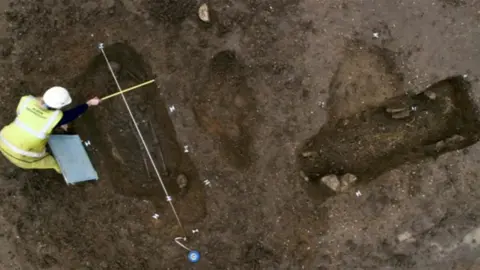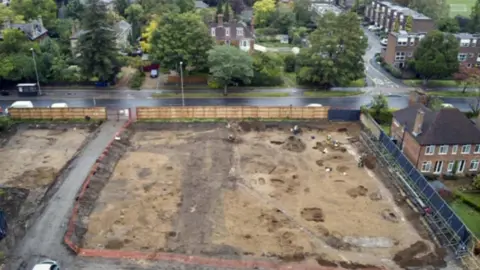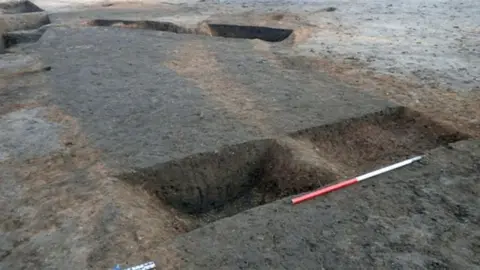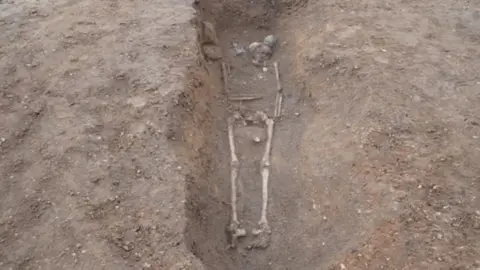Cambridge Anglo-Saxon graveyard found under King's College halls
 Dronescapes
DronescapesAn Anglo-Saxon graveyard with "huge potential" has been unearthed beneath former university student housing.
King's College, Cambridge discovered the extensive cemetery, containing more than 60 graves, after demolishing a group of 1930s buildings.
Evidence of Iron Age structures and Roman earthworks was also identified.
Dr Sam Lucy, from the University of Cambridge, said the discovery of graves spanning different periods was "very unusual and really interesting".
Since the 19th century, archaeologists have believed there was an early Medieval/Anglo-Saxon cemetery in west Cambridge.
 Dronescapes
DronescapesThe buildings at Croft Gardens, which had recently housed graduates and staff, were demolished last summer to make way for more modern halls.
Before construction started, a team from Albion Archaeology were able to fully investigate the site for the first time.
Around 700 items in the graves were uncovered, including bronze brooches, bead necklaces, swords, short blades, pottery and glass flasks.
 Albion Archaeology
Albion ArchaeologyMost date from the early Medieval period - the 4th to the 7th Centuries AD - when Anglo-Saxons lived in the East of England, but Dr Lucy said there was "a small cluster that might be late Roman".
She said the deeper, stone-lined graves were "not normally an early medieval practice".
In the Anglo-Saxon graves there "tend to be people buried fully dressed, so they've got brooches and beads holding bits of clothing together", said Dr Lucy.
"Some of them have got spearheads and the former remains of shields with them."

She said the discovery would "give huge potential for further research and actually finding out what was going on in the Cambridge area during this particular period".
To help investigate the site, King's College is funding a four-year research fellowship into late Medieval and early Roman Britain.
Researchers will look at the skeletons, the textiles and the buried possessions, to learn about out the population's origins, diet, diseases, injuries, health and lifestyle.
 Albion Archaeology
Albion ArchaeologyThough Cambridge was a Roman town, the people buried at the site would have been a "rural population, living in villages", said Dr Lucy.
"We get a really nice picture of a community and death and we try to use that to tell us a bit about how they were living their lives as well," she added.
Croft Gardens will be developed into accommodation for graduate students and is due to be completed in 2022.

Find BBC News: East of England on Facebook, Instagram and Twitter. If you have a story to tell email [email protected]
